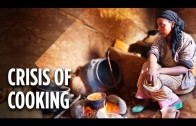Watch the next video to learn more about transforming a cellphone into a microscope:
Subscribe! https://www.youtube.com/c/seekerstories?sub_confirmation=1
Join the Seeker community!
Twitter: https://twitter.com/SeekerNetwork
Facebook: https://www.facebook.com/SeekerNetwork/
Instagram: http://instagram.com/seekernetwork
Tumblr: http://seekernetwork.tumblr.com
App – iOS http://seekernetwork.com/ios
App – Android http://seekernetwork.com/android
Nearly half the people on Earth use inefficient fuel sources like wood or coal to cook their food. Every year three to four million people die from illnesses related to smoke inhalation from cooking this way, as smoke from open fires contains high amounts of toxic chemicals which can cause a variety of illnesses, including lung cancer and stroke.
To help combat this global health issue, Danny Wilson from the Lawrence Berkeley National Laboratory has developed a specially designed efficient cookstove. Wilson and his team are distributing these stoves to places like Sudan, Darfur and Ethiopia where the problem is quite prevalent.
Laura Ling spoke with Wilson to find out more about his life-saving project for this Seeker Stories video.
—————————-
Learn more:
Cookstove Projects at Berkeley
“In Sudan’s war-torn region of Darfur, women must walk for hours to find firewood, risking attack every step of the way. In 2005, the U.S. government asked Dr. Ashok Gadgil, Deputy of Lawrence Berkeley National Lab’s Energy Technologies Area, for a solution to this grave problem. His team designed a fuel-efficient cookstove which is tailored to Darfur’s climate and cooking. The Berkeley-Darfur Stove requires less than half the fuel of traditional cooking methods, decreasing women’s exposure to violence while collecting firewood and their need to trade food rations for fuel.”
http://cookstoves.lbl.gov/index.php
Potential Energy
“We’ve designed, implemented, and scaled a high-efficiency cookstove distribution model that has impacted the lives of over 1?4 million people. We’ve distributed over 42,000 stoves in Sudan and Ethiopia, achieved high stove usage rates and measured our impact objectively through sensors and frequent contact with users.”
http://www.potentialenergy.org/solution/














